Arts & Entertainment
Best of Gay D.C. 2017: PEOPLE
Winners from the Washington Blade’s annual poll
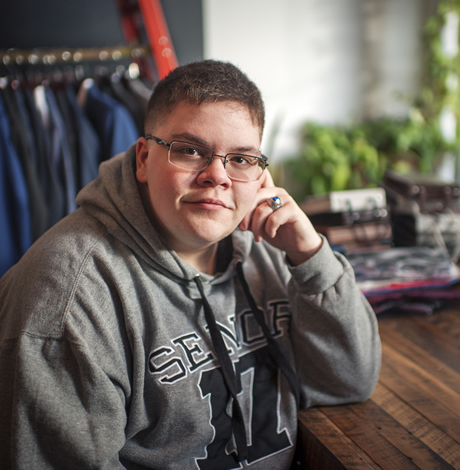
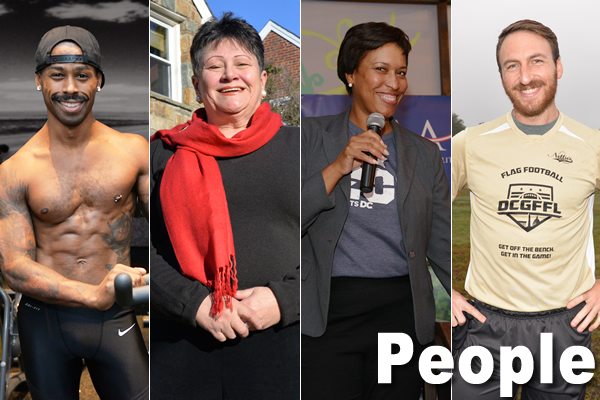
(Washington Blade photos by Michael Key)
Local Hero
Gavin Grimm
The American Civil Liberties Union in 2015 filed a federal lawsuit on behalf of Gavin Grimm, who was a student at Gloucester County High School in Gloucester, Va., at the time.
Grimm and his lawyers argued the Gloucester County School District’s policy that prohibited him from using the boys restroom or locker room because they were not consistent with his “biological gender” is unconstitutional under the 14th Amendment’s Equal Protection Clause. The lawsuit also alleged the regulation violated Title IX of the U.S. Education Amendments of 1972 that prohibits schools receiving federal funds from discriminating on the basis of sex.
The Justice Department under the Obama administration argued in Grimm’s case that Title IX requires school districts to allow trans students to use restrooms that correspond to their gender identity. The Department of Education’s Office of the General Council at the time also filed a brief in support of Grimm.
The 4th U.S. Circuit Court of Appeals in Richmond — which is the first federal appeals court to consider whether Title IX allows trans students to use facilities that are consistent with their gender identity — in April 2016 ruled in favor of Grimm. The Gloucester County School District subsequently announced it planned to petition the U.S. Supreme Court to hear the case.
The Supreme Court last October said it would hear Grimm’s case. Oral arguments were scheduled to take place on March 28, but the justices remanded the case to the 4th Circuit after President Trump rescinded the Title IX guidance.
The 4th Circuit in July sent Grimm’s case back to the U.S. District Court for the Eastern District of Virginia. The ACLU subsequently withdrew Grimm’s request for an immediate injunction against the Gloucester County School Board policy.
Grimm, 18, graduated from Gloucester County High School in June.
“I am in this for the long haul,” he said in an ACLU press release that announced the decision to amend his case. “I remain hopeful that my case will help make sure that other transgender students are able to attend school safely and without discrimination.”
Grimm in February was among those who spoke at a White House protest that corresponded with Trump’s decision to rescind the Title IX guidance.
“We will not be silenced and that we will stand with and protect trans youth,” said Grimm, speaking through tears with his mother standing by his side. “No matter what happens, no one, not even the government can even defeat a community so full of live, color, diversity and most importantly love.”
Equality Virginia and GLAAD are among the organizations that have honored Grimm over the last year.
— MICHAEL K. LAVERS

Gavin Grimm (Photo by Scout Turankjian; courtesy Wikimedia Commons)
Best Amateur Athlete
Mark Hofberg, D.C. Gay Flag Football
Runner-up: Grace Thompson, D.C. Front Runners (last year’s winner)
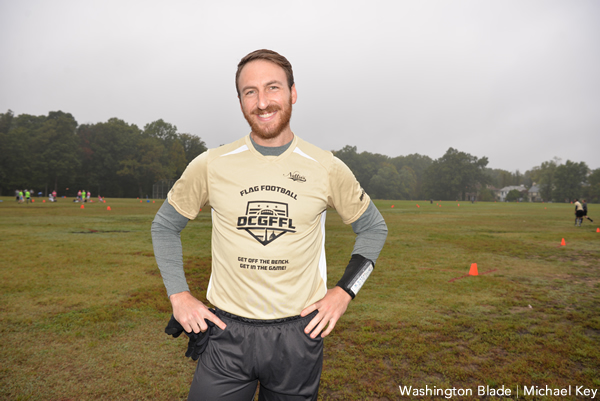
Mark Hoffberg (Washington Blade photo by Michael Key)
Best Artist
John Jack Gallagher
Runner-up: Glenn Fry
John Jack Gallagher has been taking photos since his first boyfriend gave him a 35-millimeter camera for his birthday more than 30 years ago. In 2012, he started shooting professionally after members of the Stonewall Kickball team he’d been photographing insisted he shoot their wedding. This is his second consecutive win in this category. (JD)
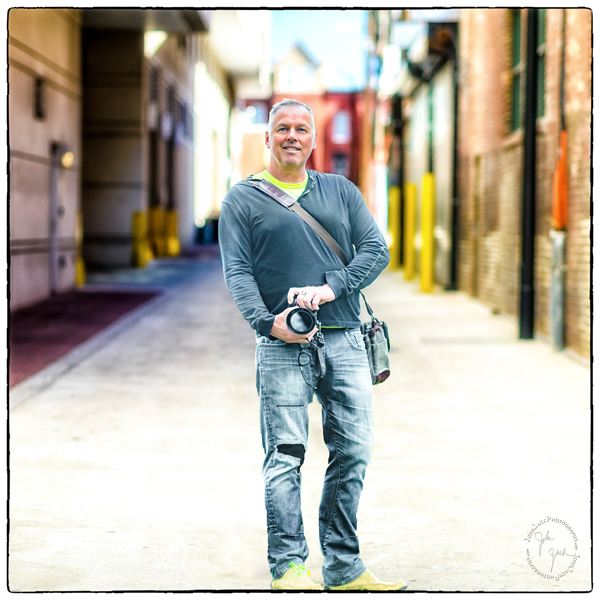
John Jack Gallagher (Photo courtesy of John Jack Photography)
Best Businessperson
Dr. Gregory Jones
Capital Center for Psychotherapy & Wellness
1330 U St., N.W.
Runner-up: Bob Witeck

Dr. Gregory Jones (Washington Blade photo by Michael Key)
Best Clergy
Bishop Allyson Abrams
Abrams reclaims her 2015 title after being last year’s runner-up. Abrams is the founder and pastor of Empowerment Liberation Cathedral in Silver Spring.
Runner-up: Rayceen Pendarvis (last year’s winner)
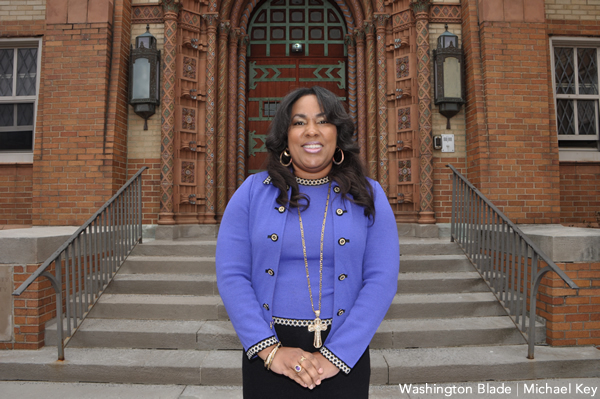
Bishop Allyson Abrams (Washington Blade photo by Michael Key)
Most Committed Activist
Ruby Corado
Corado was named Best of Gay D.C. Local Heroine in 2014 and Most Committed Activist in 2015.
Casa Ruby
2822 Georgia Ave., N.W.
Runner-up: Jason Lindsay
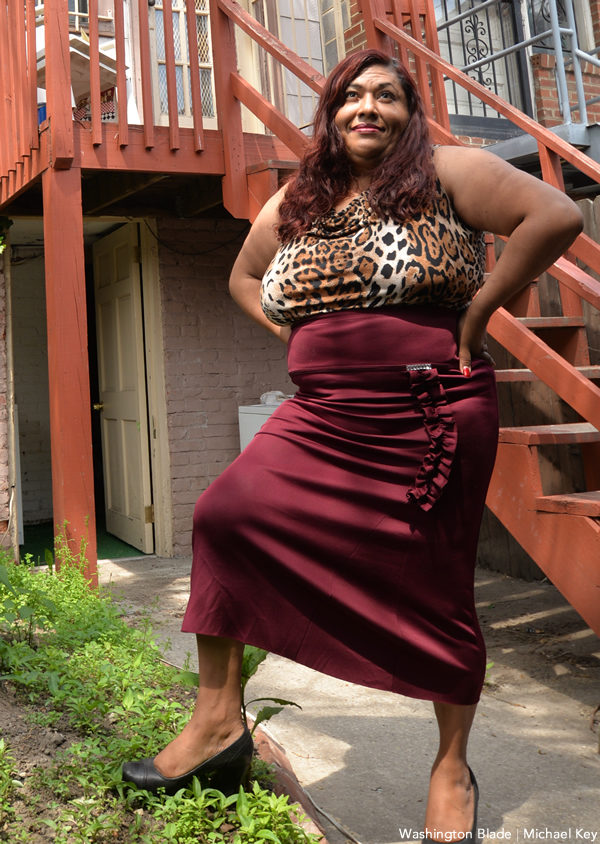
Ruby Corado (Washington Blade photo by Michael Key)
Best D.C. Public Official
Mayor Muriel Bowser
Runner-up: Randy Downs
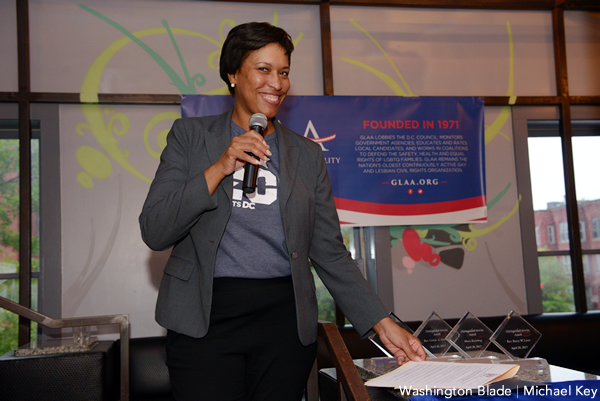
D.C. Mayor Muriel Bowser (Washington Blade photo by Michael Key)
Best Hill Staffer/LGBT Bureaucrat
Yesenia Chavez
Runner-up: Scott Filter
Yesenia Chavez identifies as queer. She got her start on Capitol Hill interning with the Victory Fund during her senior year at the University of Houston. After graduating with a degree in political science, she returned to the Hill in 2013 to work as a professional staffer for Arizona Congressman Raul Grijalva. “Typically, I handle LGBT policy and push my boss on different efforts like the LGBT Data Inclusion ACT,” she says.
Chavez also serves on the board of LGBT Congressional Staff Association.
“For the past three years I’ve been coordinating events,” she says. “Our goal is to increase the professional development growth of members interns, fellow and staff on the Hill on the House side.”
“It’s important to have queer women of color at the table,” says Chavez, 26. “We’re a smaller contingency on the Hill. We must make sure we’re safe there.”
Chavez recently bought a home with her partner in D.C.’s Eckington neighborhood and is looking to put down roots.
“Washington is an interesting place to live. Young professionals come her because they feel passionate about giving back and doing something to make the country a better place, despite their political leaning. I don’t have the same conversation here that I have with people at back in Texas.” (PF)
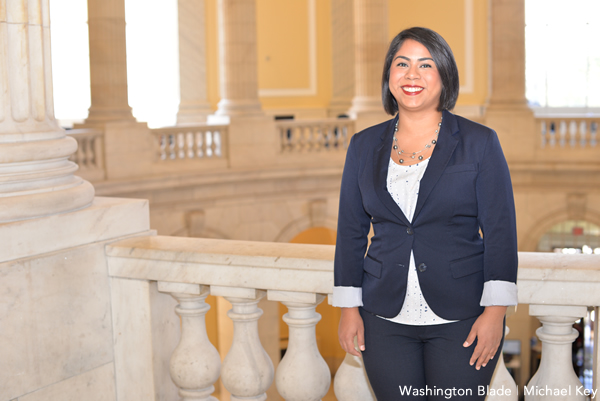
Yesenia Chavez (Washington Blade photo by Michael Key)
Best Local Pro Athlete
Bryce Harper, Washington Nationals
Last year’s runner up!
Runner-up: John Wall, Washington Wizards

Bryce Harper (Photo by Arturo Pardavila III; courtesy Wikimedia Commons)
Best Local Pro Sports Team
Washington Nationals
Editor’s choice: D.C. United

(Washington Blade photo by Michael Key)
Best Massage
Ben Auman
Runner-up: Jacob Gough
Ben Auman says he “values connections over everything else.” That’s what led him to a successful and fulfilling career as a massage therapist.
“I’m making connections with people I never would have gotten to make connections with before,” he says.
Auman moved to D.C. from North Carolina in 2005 and worked as a non-profit association manager and financial consultant. Helping his clients with their goal setting and financial planning led him to follow his own true passion: massage therapy. He studied at the Potomac Massage Training Institute and is now a Massage Therapist at Logan 14 Aveda Lifestyle Salon/Spa and the owner of Auman Massage Therapy.
Switching careers gave Auman a whole new perspective on life. “Before, getting up and going to work was a way to get paid. Now, I’m getting up every morning to do something I love and that I’m passionate about. It’s very fulfilling.” (BTC)
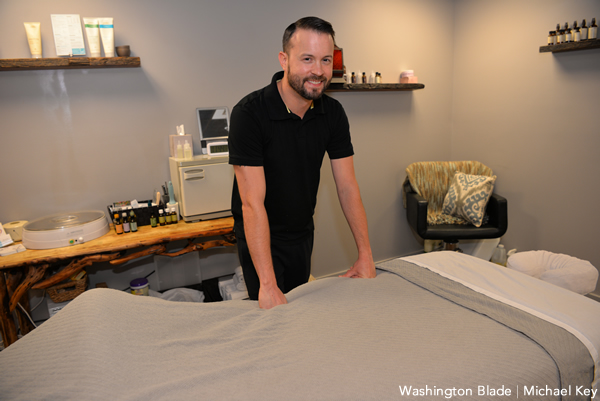
Ben Auman (Washington Blade photo by Michael Key)
Best Fitness Instructor
Jared Keith Lee
Runner-up: Grace Thompson
After relocating from New York to Washington, Jared Keith Lee felt out of place in his new surroundings, and longed for a feeling of belonging. He found what he was looking for at SoulCycle.
“I left my job as a graphic designer to become a SoulCycle instructor,” he says. “I was having a hard time finding my own way here and a place that fit. At SoulCycle people were accepting. And it was fun.”
With inspirational coaching, loud music, candle light and a full body workout (they’ve added hand weights and core work), SoulCycle is indoor cycling re-invented.
“The music and lighting allows riders to separate from their inhibitions and insecurities. It’s an individual journey, and we welcome all levels of experience,” says Lee who’s been an instructor for two years and currently works at SoulCycle’s 14th and U and Mount Vernon locations.
Lee grew up in Virginia Beach, Va. He won a soccer scholarship to Hampden-Sydney College in Farmville, Va. And while he came out in his freshman year there, Lee never felt at home on the conservative campus, so he transferred to Maryland Institute College of Art in Baltimore to study photography and design. (PF)
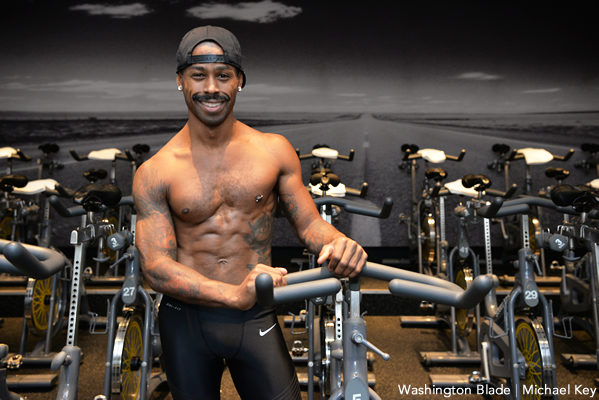
Jared Keith Lee (Washington Blade photo by Michael Key)
Best Real Estate Agent
Valerie Blake
Runner-up: Stacey Williams-Zeiger
Valerie Blake has sold real estate professionally in the D.C. area for 20 years.
Blake’s eclectic former positions include working as a diplomat overseas, a federal government executive and an adult education administrator for a training school in the federal government. She has lived in 12 states, D.C. and two foreign countries.
For Blake, working in the region is a great match.
“I think that there are so many people who are transients here that provide an opportunity to meet a lot of people that I would not get the opportunity to do otherwise,” Blake, who also won this award in 2015, says.” They come from all walks of life which really helps with my varied background because I’ve found that there are very few people that I can’t find something in common with. That’s one of the things that I think makes me help them.”
Blake, a straight ally and regular Blade contributor, has serviced the LGBT community since 1999.
“They have been a continued source of great clients and wonderful friends over the years,” Blake says.
As for her best tip for buying a home in the area, she says it’s all about balance.
“Find out how much of a mortgage you’re approved for and then reduce it so that you can continue to have a life as well as a house,” Blake says. (MC)
Valerie Blake
11 Dupont Circle, N.W.
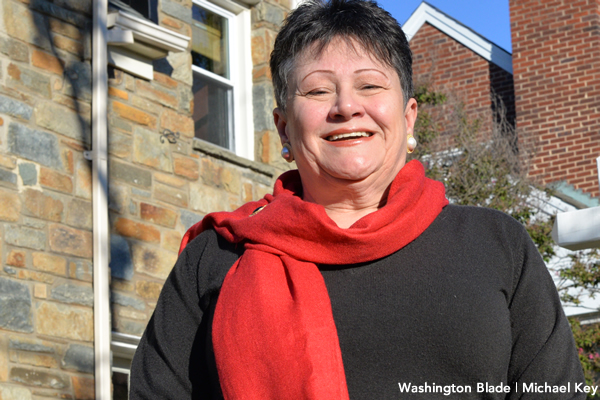
Valerie Blake (Washington Blade photo by Michael Key)
Best Real Estate Group
The Bediz Group, Keller Williams
1918 18th St., N.W.
Runner-up: The Evan and Mark Team, Compass
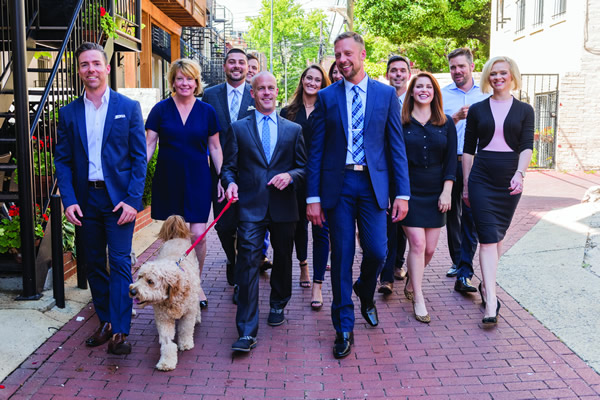
(Photo courtesy of the Bediz Group)
Best Rehoboth Real Estate Agent
Chris Beagle
Third consecutive win in this category!
Runner-up: Andy Staton
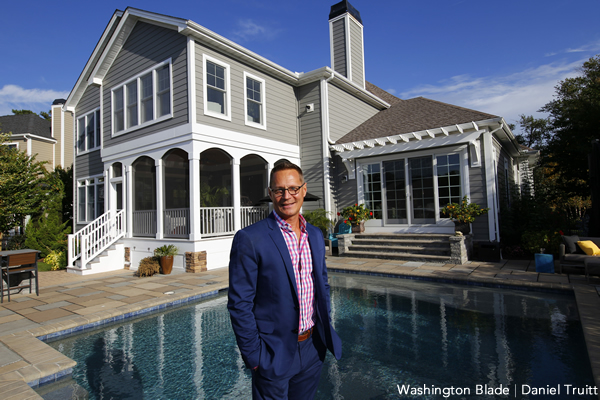
Chris Beagle (Washington Blade photo by Daniel Truitt)
Best Straight Ally
Pamala Stanley
Runner-up: Muriel Bowser
Singer Pamala Stanley joins an elite group as this year’s Best Straight Ally. Past title holders include everyone from Barack Obama and Hillary Clinton to local allies such as Meghan Davies (Whitman-Walker), Leigh Ann Hendricks (Level One) and Phil Hicks (PFLAG).
Stanley is beloved for her string of Billboard Hot Dance Club Play hits such as “This is Hot,” “I Don’t Want to Talk About It,” “Coming Out of Hiding” and more in the late ‘70s through the mid-‘80s.
Stanley says it’s hard to convey why she’s always felt so strongly at home with her gay fans.
“There’s a love for life there. They listen to what you have to say and you can really be yourself,” the dance diva says. “Years ago with the straight crowd, I felt there were certain things I couldn’t talk about — dating, life, men. I had to always make sure that I kept it a certain way. But when I played for the gay crowd, I could tell them anything — good, bad, whatever, and they just got a big kick out of it. They didn’t judge, they just loved you no matter what you were doing and … I think I needed that. They were always very good to me and just fun people.”
Stanley splits her time between her home on Virginia’s Eastern Shore and Rehoboth Beach, Del., where she performs year around at tea dances, jazz brunches, private parties and more. She’s at the Blue Moon (35 Baltimore Ave., Rehoboth Beach, Del.) every Sunday and Monday and says she’s grateful to be in demand.
“I’m very busy here,” she says. “I’m lucky.” (JD)
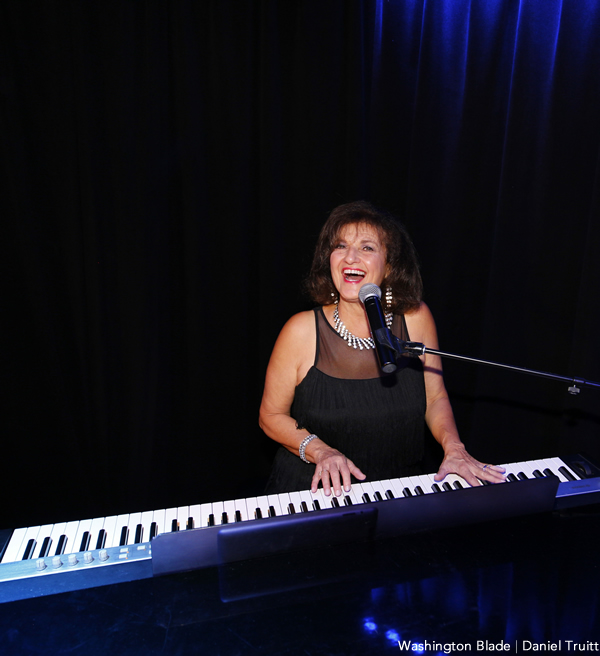
Pamala Stanley (Washington Blade photo by Michael Key)
Best Transgender Advocate
Sarah McBride
Runner-up: Gavin Grimm
By any measure, Sarah McBride has an impressive resume and an amazing list of accomplishments.
She first came to national attention in 2012 when she came out as transgender while serving as student body president at American University. Following her graduation, she interned at the Obama White House, becoming the first openly transgender woman to work there in any capacity. When McBride spoke at the 2016 Democratic National Convention in Philadelphia, she became the first openly transgender person to address the national convention of major political party.
McBride, who also won this category last year, has worked on LGBT issues at the Canter for American Progress and is currently the National Press Secretary for the Human Rights Campaign. A native of Wilmington, Del., she is also on the board of Equality Delaware and is widely credited with leading the successful effort to add gender identity and expression to her state’s nondiscrimination and hate-crimes laws.
McBride describes herself as an “outgoing introvert” and says that some of her major influences are Barack Obama, Franklin Roosevelt, Carl Sagan, Hilary Clinton and Abraham Lincoln. She dedicates her fierce activism to her late husband Andrew Cray, a transgender man and fellow advocate. They met when McBride was working at the White House. Cray was diagnosed with terminal cancer in 2014, and just days after they married, he died. His death instilled in McBride a firm belief in the urgency of political and social change.
Her first book “Tomorrow Will Be Different” will be published in March. (BTC)
Human Rights Campaign Fund
1640 Rhode Island Ave., N.W.

Sarah McBride speaking at the 2016 Democratic National Convention. (Blade photo by Michael Key)
Best Stylist
Quency Valencia
Second consecutive win in this category!
Salon Quency
1534 U St. N.W. No. 1
Runner-up: Bryan Smith
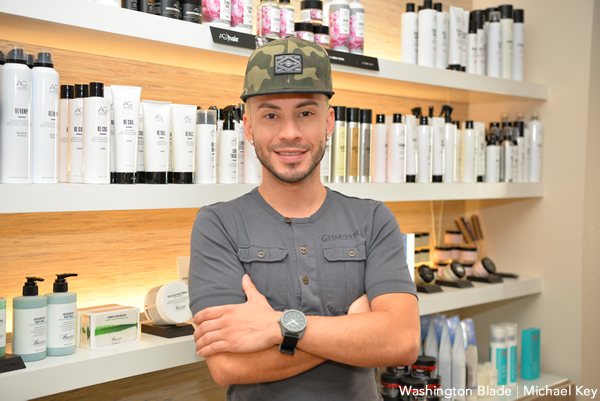
Quency Valencia (Washington Blade photo by Michael Key)
To see winners in other categories in the Washington Blade’s Best of Gay D.C. 2017 Awards, click here.

Friday, February 13
Center Aging Monthly Luncheon With Yoga will be at noon at the DC Center for the LGBT Community. Email Mac at [email protected] if you require ASL interpreter assistance, have any dietary restrictions, or questions about this event.
Go Gay DC will host “LGBTQ+ Community Happy Hour Meetup” at 7 p.m. at Freddie’s Beach Bar and Restaurant. This is a chance to relax, make new friends, and enjoy happy hour specials at this classic retro venue. Attendance is free and more details are available on Eventbrite.
Women in their Twenties and Thirties will be at 7 p.m. on Zoom. This is a social discussion group for queer women in the D.C. area. For more details, visit the group on Facebook.
Saturday, February 14
Go Gay DC will host “LGBTQ+ Community Brunch” at 11 a.m. at Freddie’s Beach Bar & Restaurant. This fun weekly event brings the DMV area LGBTQ community, including allies, together for delicious food and conversation. Attendance is free and more details are available on Eventbrite.
The DC Center for the LGBT Community will host a screening of “Love and Pride” at 1:30 p.m. This event is a joy-filled global streaming celebration honoring queer courage, Pride, and the power of love. It’s a bold celebration of courage and community — a fearless reminder of what we’ve overcome, how love is what makes us unstoppable, and how we have always turned fear into fierce. For more details, visit the Center’s website.
Sunday, February 15
LGBTQ+ Community Coffee and Conversation will be at 12 p.m. at As You Are. This event is for people looking to make more friends and meaningful connections in the LGBTQ community. Attendance is free and more details are available on Eventbrite.
Monday, February 16
Queer Book Club will be at 7:00p.m. on Zoom. This month’s read is “Faebound” by Saara El-Arifi. For more details, visit the DC Center’s website.
“Center Aging: Monday Coffee Klatch” will be at 10 a.m. on Zoom. This is a social hour for older LGBTQ+ adults. Guests are encouraged to bring a beverage of choice. For more information, contact Adam ([email protected]).
Tuesday, February 17
Center Bi+ Roundtable will be at 7 p.m. on Zoom. This is an opportunity for people to gather in order to discuss issues related to bisexuality or as Bi individuals in a private setting.Visit Facebook or Meetup for more information.
Wednesday, February 18
Job Club will be at 6 p.m. on Zoom upon request. This is a weekly job support program to help job entrants and seekers, including the long-term unemployed, improve self-confidence, motivation, resilience and productivity for effective job searches and networking — allowing participants to move away from being merely “applicants” toward being “candidates.” For more information, email [email protected] or visit thedccenter.org/careers.
Thursday, February 19
The DC Center’s Fresh Produce Program will be held all day at the DC Center for the LGBT Community. To be fair with who is receiving boxes, the program is moving to a lottery system. People will be informed on Wednesday at 5 p.m. if they are picked to receive a produce box. No proof of residency or income is required. For more information, email [email protected] or call 202-682-2245.
Virtual Yoga Class will be at 7 p.m. on Zoom. This free weekly class is a combination of yoga, breath work and meditation that allows LGBTQ+ community members to continue their healing journey with somatic and mindfulness practices. For more details, visit the DC Center’s website.
Movies
As Oscars approach, it’s time to embrace ‘KPop Demon Hunters’
If you’ve resisted it, now’s the time to give in

If you’re one of the 500 million people who made “KPop Demon Hunters” into the most-watched original Netflix title in the streaming platform’s history, this article isn’t for you.
If, however, you’re one of the millions who skipped the party when the Maggie Kang-created animated musical fantasy debuted last summer, you might be wondering why this particular piece of pop youth culture is riding high in an awards season that seems all but certain to end with it winning an Oscar or two; and if that’s the case, by all means, keep reading.
We get it. If you’re not a young teen (or you don’t have one), it might have escaped your radar. If you don’t like KPop, or the fantasy genre just isn’t your thing, there would be no reason for that title to pique your interest – on the contrary, you would assume it’s just a movie that wasn’t made for you and leave it at that.
It’s now more than half a year later, though, and “KPop Demon Hunters” has yet to fade into pop culture memory, in spite of the “new, now, next” pace with which our social media world keeps scrolling by. It might feel like there’s been a resurgence of interest since the film’s ongoing sweep of major awards in the Best Animated Film and Best Song categories has led it close to Oscar gold, but in reality, the interest never really flagged. Millions of fans were still streaming the soundtrack album on a loop, all along.
It wasn’t just the music that they embraced, though that was definitely a big factor – after all, the film’s signature song, “Golden,” has now landed a Grammy to display alongside all of its film industry accolades. But Kang’s anime-influenced urban fantasy taps into something more substantial than the catchiness of its songs; through the filter of her experience as a South Korean immigrant growing up in Canada, she draws on the traditions and mythology of her native culture while blending them seamlessly into an infectiously contemporary and decidedly Western-flavored “girl power” adventure about an internationally popular KPop girl band – Huntrix, made up of lead singer Rumi (Arden Cho), lead dancer Mira (May Hong), and rapper/lyricist Zoey (Ji-young Yoo) – who also happen to be warriors, charged with protecting humankind from the influence of Gwi-Ma (Lee Byung-hun), king of the demon world, which is kept from infiltrating our own by the power of their music and their voices. Oh, and also by their ability to kick demon ass.
In an effort to defeat the girls at their own game, Gwi-Ma sends a demonic boy band led by handsome human-turned-demon Jinu (Ahn Hyo-seop) to steal their fans, creating a rivalry that (naturally) becomes complicated by the spark that ignites between Rumi and Jinu, and that forces Rumi to confront the half-demon heritage she has managed to keep secret – even from her bandmates – but now threatens to destroy Huntrix from within, just when their powers are needed most.
It’s a bubble-gum flavored fever-dream of an experience, for the most part, which never takes itself too seriously. Loaded with outrageous kid-friendly humor and pop culture parody, it might almost feel as if it were making fun of itself if not for the obvious sincerity it brings to its celebration of all things K-Pop, and the tangible weight it brings along for the ride through its central conflict – which is ultimately not between the human and demon worlds but between the long-held prejudices of the past and the promise of a future without them.
That’s the hook that has given “KPop Demon Hunters” such a wide-ranging and diverse collection of fans, and that makes it feel like a well-timed message to the real world of the here and now. In her struggle to come to terms with her part-demon nature – or rather, the shame and stigma she feels because of it – Rumi becomes a point of connection for any viewer who has known what it’s like to hide their full selves or risk judgment (or worse) from a world that has been taught to hate them for their differences, and maybe what it’s like to be taught to hate themselves for their differences, too.
For obvious reasons, that focus adds a strong layer of personal relevance for queer audiences; indeed, Kane has said she wanted the film to mirror a “coming out” story, drawing on parallels not just with the LGBTQ community, but with people marginalized through race, gender, trauma, neurodivergence – anything that can lead people to feel like an “other” through cultural prejudices and force them to deal with the pressure of hiding an essential part of their identity in order to blend in with the “normal” community. It plays like a direct message to all who have felt “demonized” for something that’s part of their nature, something over which they have no choice and no control, and it positions that deeply personal struggle as the key to saving the world.
Of course, “KPop Demon Hunters” doesn’t lean so hard into its pro-diversity messaging that it skimps on the action, fun, and fantasy that is always going to be the real reason for experiencing a genre film where action, fun, and fantasy are the whole point in the first place. You don’t have to feel like an “other” to enjoy the ride, or even to get the message – indeed, while it’s nice to feel “seen,” it’s arguably much more satisfying to know that the rest of the world might be learning how to “see” you, too. By the time it reaches its fittingly epic finale, Kane’s movie (which she co-directed with Chris Appelhans, and co-wrote with Appelhans, Danya Jimenez, and Hannah McMechan) has firmly made its point that, in a community threatened by hatred over perceived differences, the real enemy is our hate – NOT our differences.
Sure, there are plenty of other reasons to enjoy it. Visually, it’s an imaginative treat, building an immersive world that overlays an ancient mythic cosmology onto a recognizably contemporary setting to create a kind of whimsical “metaverse” that feels almost more real than reality (the hallmark of great mythmaking, really); yet it still allows for “Looney Toons” style cartoon slapstick, intricately choreographed dance and battle sequences that defy the laws of physics, slick satirical commentary on the juggernaut of pop music and the publicity machine that drives it, not to mention plenty of glittery K-Pop earworms that will take you back to the thrill of being a hormonal 13-year-old on a sugar high; but what makes it stand out above so many similar generic offerings is its unapologetic celebration of the idea that our strength is in our differences, and its open invitation to shed the shame and bring your differences into the light.
So, yes, you might think “KPop Demon Hunters” would be a movie that’s exactly what it sounds like it will be – and you’d be right – but it’s also much, much more. If you’ve resisted it, now’s the time to give in.
At the very least, it will give you something else to root for on Oscar night.
a&e features
Meet D.C.’s Most Eligible Queer Singles
Our annual report, just in time for Valentine’s Day

Just in time for Valentine’s Day, the Blade is happy to present our annual Most Eligible Singles issue. The Singles were chosen by you, our readers, in an online nominations process.
John Marsh

Age: 35
Occupation: DJ and Drag Entertainer
How do you identify? Male
What are you looking for in a mate? I’m looking for someone who’s ready to dive into life’s adventures with me. someone independent and building their own successes, but equally open to supporting each other’s dreams along the way. I know that probably sounds simple because, honestly, who isn’t looking for that? But my life and career keep me very social and busy, so it’s important to me to build trust with someone who understands that. I want a partner who knows that even when life gets hectic or I’m getting a lot of attention through my work in the community, it doesn’t take away from my desire to build something real, intentional, and meaningful with the right person.
Biggest turn off: My biggest turnoff is arrogance or judgment toward others. I’m most drawn to people who are comfortable being themselves and who treat everyone with the same level of respect and care. I’ve worked hard for the success I’ve found, but I believe in staying humble and leading with kindness, and I’m attracted to people who live the same way. I’m also turned off by exclusionary mindsets, especially the idea that sapphic folks don’t belong in gay spaces. Our community is vibrant, diverse, and strongest when it’s shared with everyone who shows up with respect and love
Biggest turn on: I’m drawn to people who can confidently walk into new spaces and create connection. Being able to read a room and make others feel comfortable shows emotional intelligence and empathy, which I find incredibly attractive. I also come from a very social, open, and welcoming family environment, so being with someone who embraces community and enjoys bringing people together is really important to me.
Hobbies: I have a lot of hobbies and love staying creative and curious. I’m a great cook, so you’ll never have to worry about going hungry around me. In my downtime, I watch a lot of anime and I will absolutely talk your ear off about my favorites if you let me. I’m also a huge music fan and K-pop lover (listen to XG!), and I’m a musician who plays the cello. I spend a lot of time sewing as well, which is a big part of my creative expression. My hobbies can be a little all over the place, but I just genuinely love learning new skills and trying new things whenever I can.
What is your biggest goal for 2026? This year feels like a huge milestone for me. I’m getting ready to join a tour this summer and want to represent myself well while building meaningful connections in every city I perform in. I’m also focused on growing as a DJ, sharing more mixes and content online, and reaching a big creative goal of releasing original music that I’m producing.
Pets, Kids or Neither? I have a lovely Akita named Grady that I’ve had for 10 years and always want pets in my life. I’m open to kids when/if the time is right with the right person.
Would you date someone whose political views differ from yours? Hell no. I don’t see political differences as just policy disagreements anymore – they often reflect deeper values about how we treat people and support our communities. I’m very progressive in my beliefs, and I’m looking for a partner who shares that mindset. For me, alignment in values like equity, compassion, and social responsibility is non-negotiable in a relationship. To be very clear about my beliefs, I’m outspoken about my opposition to immigration enforcement systems like ICE and believe both political parties have contributed to policies that have caused real harm to vulnerable communities. I’m also deeply disturbed by the ongoing violence in Palestine and believe we need to seriously examine our support of military actions that have resulted in the loss of countless innocent lives. These aren’t abstract political opinions for me, they are moral issues that directly inform who I am and what I stand for.
Celebrity crush: Cocona
Name one obscure fact about yourself: I used to own a catering business in college that paid for my school — I also went to a Christian college, lol.
Jackie Zais

Age: 35
Occupation: Senior director at nonprofit
How do you identify? Lesbian woman
What are you looking for in a mate? Looking for someone who’s curious about the world and the people in it — the kind of person who’s down to explore a new spot one night and stay in with takeout the next. Confident in who they are, social without being exhausting, adventurous but grounded, thoughtful but not pretentious. Someone who can be funny while still taking life (and relationships) seriously.
Biggest turn off: Doesn’t have strong opinions. I love hearing a wild hot take.
Biggest turn on: When someone can make me belly laugh.
Hobbies: Number one will always be yapping with friends over food, but I also love collecting new hobbies. Currently, I crochet (and have some dapper sweater vests as a result), listen to audiobooks on what I personally think is a normal speed (2x) and play soccer and pickleball. But I’ve tried embroidery, papier-mâché, collaging, collecting plants, scrap booking, and mosaic.
What is your biggest goal for 2026? I’ve recently started swimming and I want to look less like a flailing fish and more like someone who knows what they’re doing.
Pets, Kids or Neither? I have neither but open to kids
Would you date someone whose political views differ from yours? My best friend is a moderate Democrat and that’s as far right as I’m willing to go.
Celebrity crush: Tobin Heath
Name one obscure fact about yourself: I’m the daughter of Little Miss North Quincy 1967.
Kevin Schultz

Age: 39
Occupation: Product manager
How do you identify? Gay
What are you looking for in a mate? You know 2001’s hottest Janet Jackson single, “Someone to Call My Lover?” To quote Janet, “Maybe, we’ll meet at a bar, He’ll drive a funky car; Maybe, we’ll meet at a club, And fall so deeply in love.”
Realistically though, I’d love to find someone who loves to walk everywhere and who avoids the club because it’s too loud and crowded. Later in the song, our songstress opines “My, my, looking for a guy, guy, I don’t want him too shy; But he’s gotta have the qualities, That I like in a man: Strong, smart, affectionate” and I’m quite aligned there – I’m an introvert looking for someone more extroverted.
I’m looking for someone who is different from me. When the math works, one plus one should equal two. Two becoming one is more art, and my relational approach is more science, or, I guess, math.
Biggest turn off: I’m turned off by a lot of superficially small things — chewing with one’s mouth open, dirty or untrimmed fingernails, oh, and also, lack of self awareness. My personal brand of anxiety is hyper self-aware, so I’m very turned off by someone who doesn’t realize that they exist in the world with others.
Biggest turn on: Competency. Or maybe…eyes? So perhaps, you see my conundrum — I’m very engaged by people who are deeply engaged by something, but I’d be lying if I said a sharp gaze and a wink didn’t get me. And, you know, some stamina in all avenues, mental and physical doesn’t hurt either.
Hobbies: Fixing everyone’s WiFi (this did actually get me a date once), and just generally fixing everyone’s everything. If it’s got a plug, screen, or buttons I can probably help you with it. On my own, I’m really into smart home devices and automation, and just to be timely, my latest thing is setting up and tuning my own instance of OpenClaw. (No one should actually do this, which is why I’m trying.) Together, we could also explore such hobbies as visiting every Metro station, visiting and exploring a new airport, and exploring why there are so many gay transit nerds. There’s no non-fake sounding way to say this but I also just love knowledge seeking, so I’d also love to go on an adventure with you where we learn something brand new.
What is your biggest goal for 2026? My biggest goal is to arrive to 2027 just a little better than I arrived to 2026. A few gym goals, a few personal goals, a few work goals; I hope to get a few of them across the finish line. At the risk of holding myself accountable, one of those goals is to be able to flawlessly side plank for over a minute. Please don’t mistake me for a huge gym rat; I just have a questionable relationship with balance and I’m really working on it.
Pets, Kids or Neither? I’ll just be blunt: no pets. Stating this on my Hinge profile resulted in an exponential loss of matches, so it’s very fun to trot out the idea. Primarily, I’m allergic to cats and dogs so my aversion is mostly biological. I’m not, however, allergic to kids — big fan of my various nieces and nephews — but I’d really only consider kids of my own if my chosen companion and I could financially afford them without compromise, and at this age I’ve become opinionated about the life I want to live.
Would you date someone whose political views differ from yours? No. This becomes a simpler answer with each passing day, unfortunately.
Celebrity crush: If I’m being of the moment, of course, it’s going to be one of the gentlemen on “Heated Rivalry,” but if I were to really dig into the archives it would be pre-Star Trek Chris Pine. I first saw him in an absolute train wreck of a movie called “Blind Dating” where he plays a blind guy who tries to pretend to be sighted in order to date. The movie was terrible, but I found him irresistible.
Name one obscure fact about yourself: I went suddenly deaf on one side only (my left) just before my 33rd birthday. After a bit of time in the wilderness (metaphorically) I got a cochlear implant a few years later, and it really changed my life. I will talk until someone stops me about hearing, sound, and the amazing arena of hearing loss technology. A lot of people, when they see my implant, assume I was born with hearing loss, so it’s always a bit odd (obscure even!) when I tell people I lost it as an adult. But, I also got my hearing back as an adult and am an eager advocate for assistive technology and visibility for people with disabilities that are not always immediately visible. I also work with prospective adult implant candidates to determine if an implant is right for them, because losing hearing suddenly as an adult is isolating and it’s helpful to talk to someone who’s been there.
Gabriel Acevero

Age: 35
Occupation: Maryland State Delegate
How do you identify? Gay
What are you looking for in a mate? Emotional intelligence and a sense of humor.
Biggest turn off: Fetishization.
Biggest turn on: Kindness and emotional intelligence.
Hobbies: Traveling and reading (I love books).
What is your biggest goal for 2026? More self care. I love what I do but it can also be physically taxing. In 2026, I’m prioritizing more self care.
Pets, Kids or Neither? I have neither but I’m open to both.
Would you date someone whose political views differ from yours? No.
Celebrity crush: Kofi Siriboe
Name one obscure fact about yourself: I’m a Scorpio who was raised by a Scorpio and I have many Scorpios in my life.
Vida Rangel

Age: 36
Occupation: Public Servant, Community Organizer
How do you identify? I am a queer transLatina
What are you looking for in a mate? I’m looking for a partner who is caring, socially aware, and passionate about meaningfully improving some part of this world we all live in. Ideally someone playful who can match my mischievous energy, will sing and dance with me whenever joy finds us, and will meet me at protests and community meetings when the moment calls for bold collective action.
Biggest turn off: Ego. Confidence can be cute, but humility is sexy.
Biggest turn on: Drive. Seeing someone put their heart into pursuing their goals is captivating. Let’s chase our dreams together!
Hobbies: Music in all its forms (karaoke, playing guitar, concerts, musicals…), finding reasons to travel to new places, and making (Mexican) tamales for friends and coworkers.
What is your biggest goal for 2026? My biggest goal for 2026 is to organize and a celebratory kiss on election night wouldn’t hurt.
Pets, Kids or Neither? An adorable black cat named Rio (short for Misterio)
Would you date someone whose political views differ from yours? Ma’am? If you feel the need to ask…
Celebrity crush: Mi amor, Benito Bad Bunny. Zohran Mamdani, too. I have lots of love to give.
Name one obscure fact about yourself: I worked at Chick-fil-A when I was in high school and was fired after just three months. At the time it was still legal to fire someone for being trans, but I’m pretty sure it was because I called out to go to a Halloween party.
Em Moses

Age: 34
Occupation: Publishing
How do you identify? Queer
What are you looking for in a mate? Companionship, passion, fun. I seek a confident partner who inspires me, someone to laugh and dance with, someone with a rich internal universe of interests and experiences to build upon. A lifelong friend.
Biggest turn off: Dishonesty.
Biggest turn on: I love when someone is exactly themselves, nurturing their passions and skills and showing up uniquely in this world as only they can.
Hobbies: I love to read. I create art with my hands. When the weather is nice I’m outside, walking around the District looking at flowers and trees.
What is your biggest goal for 2026? My main goal this year is to spend more time with my nieces and nephews.
Pets, Kids or Neither? No pets or children in my life currently.
Would you date someone whose political views differ from yours? While I consider myself quite openminded and genuinely enjoy learning from perspectives different from my own, I have clear boundaries around my morals and those pillars do not fall.
Celebrity crush: Luigi Mangione
Name one obscure fact about yourself: My first job was at a donut shop.
Nate Wong

Age: 41
Occupation: Strategy adviser to nonprofits and philanthropists to help ambitious ideas turn into meaningful, positive societal impact.
How do you identify? Gay (he/him)
What are you looking for in a mate? An additive partner: sociable, adventurous, and curious about the world. I’m drawn to warmth, openness, and people who show up fully — one-on-one and in community. If you enjoy a good dinner party, make eye contact, and actually talk to strangers (I know a D.C. no-no), we’ll get along just fine.
Biggest turn off: Not being present. Active listening matters to me; attention is a form of respect (and honestly, very attractive). And a picky food eater (how will we some day be joint food-critics?).
Biggest turn on: Curiosity, adventuresome spirit, and someone who can hold their own in a room — and still make others feel at ease. Confidence is best when it’s generous.
Hobbies: Splitting my time between the ceramics studio (District Clay), planning the next trip, and finding great food spots. I box to balance it all out, and I love curating small, adventurous gatherings that bring interesting people together — the kind where you stay later than planned.
What is your biggest goal for 2026? The last few years threw some curve balls. So 2026 is all about moving forward more freely and passionately, trusting what feels right and following it with intention (and joy).
Pets, Kids or Neither? Open to kids (in a variety of forms — already have some adorable god kids). A hypoallergenic dog would absolutely raise the cuddle quotient; cats are best admired from a respectful, allergy-safe distance.
Would you date someone whose political views differ from yours? I value thoughtful listening and sincere debate; shared values around the honoring of everyone’s humanity, equity, and justice matter to me and aren’t up for debate.
Celebrity crush: Bad Bunny style with Jason Momoa humble confidence (harking to my Hawaiian roots) and Idris Elba charm — range matters.
Name one obscure fact about yourself: I celebrated medical clearance by going surfing in El Salvador. I’ve also nearly been arrested in Mozambique and somehow walked away unscathed (and without complying with a bribe) — happy to explain over an excursion.
Diane D’Costa

Age: 29
Occupation: Artist + Designer
How do you identify? Queer/lesbian
What are you looking for in a mate? A cuddle buddy, a fellow jet setter, a muse! Someone to light my soul on fire (in a good way).
Biggest turn off: Apathy. I care deeply about a lot of things and need someone with a similar curiosity and zest for life.
Biggest turn on: Mutuality really does it for me — a push and pull, someone who will throw it back and also catch it. I love someone who takes initiative, shows care and compassion, and expresses fluidity and confidence.
Hobbies: You can find me throwing pottery, painting, sipping natural wine, supporting local coffee shops, and most definitely tearing up a QTBIPOC dance floor.
What is your biggest goal for 2026? Producing my first solo art show. This year I’m really leaning into actualizing all my visions and dreams and putting them out into the world.
Pets, Kids or Neither? I’ve got a Black Lab named Lennox after the one and only D.C. icon, Ari Lennox. I love supporting the youth and (made a career out of it), but don’t necessarily need to have little ones of my own.
Would you date someone whose political views differ from yours? No. Values alignment is key, but if you wanna get into the nuances of how we actualize collective liberation let’s get into it.
Celebrity crush: Queen Latifah
Name one obscure fact about yourself: I’m in the “Renaissance” movie. I know, I know slight flex… but “Crazy In Love” bottom left corner for a split second and a harsh crop, but I’m in there. “You are the visuals, baby” really hit home for me.
Donna Marie Alexander

Age: 67
Occupation: Social Worker
How do you identify? Lesbian
What are you looking for in a mate? Looking for a smart, kind, emotionally grown woman who knows who she is and is ready for real companionship. Also, great discernment and a good lesbian processor. Bonus points if you’ll watch a game with me— or at least cheer when I do. Extra bonus if you already know that women’s sports matter.
Ideal first date: Out for tea or a Lemon Drop that turns into dinner, great conversation, and a few laughs. Low drama, high warmth.
Must haves: A sense of humor, curiosity about the self, curiosity about me, and curiosity about the world. An independence, and an appreciation for loyalty—on and off the field. Dealbreaker: Anyone who thinks “it’s just a game.”
Biggest turn off: Self-centered and a lack of discernment.
Biggest turn on: Great conversation and a sense of humor.
Hobbies: Watching the Commanders game
What is your biggest goal for 2026? Self-growth and meeting an amazing friend.
Pets, Kids or Neither? I have two kids and grandkids.
Would you date someone whose political views differ from yours? No
Celebrity crush: Pam Grier
Name one obscure fact about yourself: She’s way more superstitious about game-day routines than she lets on
Joe Reberkenny

Age: 24
Occupation: Journalist
How do you identify? Gay
What are you looking for in a mate? Someone who’s driven, flexible, and independent. I’m a full-time journalist so if there’s news happening, I’ve gotta be ready to cover breaking stories. I’m looking for someone who also has drive in their respective career and is always looking to the future. I need someone who gets along with my friends. My friends and community here are so important to me and I’m looking for someone who can join me in my adventures and enjoys social situations.
Biggest turn off: Insecurity and cocky men. Guys who can’t kiki with the girls. Early bedtimes.
Biggest turn on: Traits: Emotional stability and reliability. A certain sense of safety and trust. Someone organized and open to trying new things. Physical: Taller than I am (not hard to do at 5’7″) but also a preference for hairy men (lol). Someone who can cook (I am a vegetarian/occasional pescatarian and while it’s not a requirement for me in a partner it would need to be something they can accommodate).
Hobbies: Exploring D.C. — from museums to nightlife, reading (particularly interested in queer history), dancing, frolicking, playing bartender, listening to music (preferably pop), classic movie connoisseur (TCM all the way).
What is your biggest goal for 2026? Continue my work covering LGBTQ issues related to the federal government, uplift queer voices, see mother monster (Lady Gaga) in concert.
Pets, Kids or Neither? I’ve got neither but I love a pet.
Would you date someone whose political views differ from yours? No
Celebrity crush: Pedro Pascal
Name one obscure fact about yourself: I’ve been hit by multiple cars and I have a twin sister.
-

 New York4 days ago
New York4 days agoPride flag removed from Stonewall Monument as Trump targets LGBTQ landmarks
-

 Italy5 days ago
Italy5 days agoOlympics Pride House ‘really important for the community’
-

 Florida4 days ago
Florida4 days agoDisney’s Gay Days ‘has not been canceled’ despite political challenges
-

 District of Columbia4 days ago
District of Columbia4 days agoCapital Pride wins anti-stalking order against local activist



















